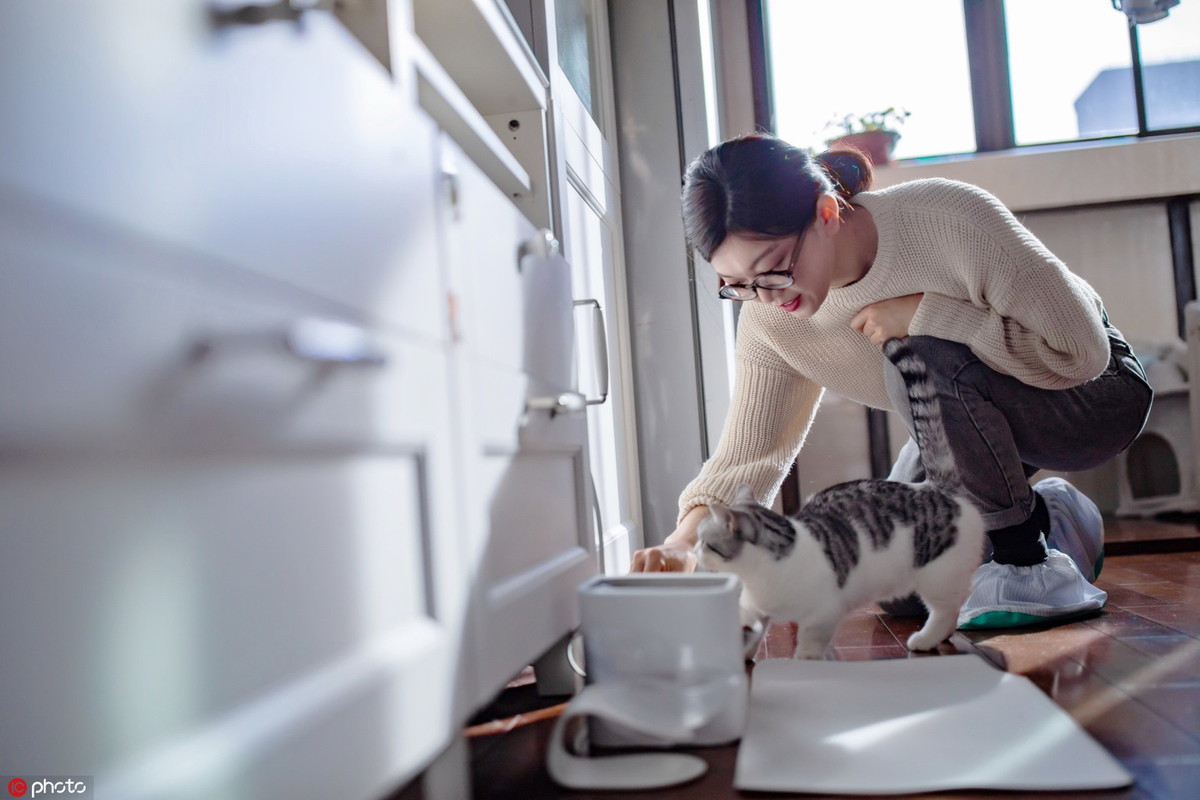
This file photo taken on March 14, 2019 shows Jia Wenjing feeding a cat at her client’s home in Beijing. Jia is paid to take care of cats left at home while their owners travel. [Photo/IC]
Pet care at home has emerged as a booming business during the Spring Festival holiday as urban professionals leave their pets behind for family reunions, showing both opportunities and challenges.
A woman surnamed You in Beijing said she provided in-home pet care more than 150 times from February 4 to 17, earning a total of 15,000 yuan ($2,100).
You mentioned that he fed 68 cats, two dogs, two chinchillas, two loaches, two turtles, as well as small fish and plants. He described his busiest day, leaving home at 6 am and not completing his tasks until almost 1 am the next day.
“I was very busy this Chinese New Year. I even missed going to New Year’s Eve dinner while walking clients’ dogs,” she said.
In Hangzhou, demand for home pet care is also high during the holiday season.
A woman surnamed Chen, working in Hangzhou, planned ahead to leave her cat in the city. “Domestic cats are sensitive and shy. They have a poor ability to adapt to unfamiliar environments, so leaving them in a familiar place and having someone come in to help feed them is the best choice,” he said. She also considers pet boarding services at pet stores.
“Boarding a cat in Hangzhou generally costs between 100 and 200 yuan per day, reaching over 1,000 yuan for the entire Chinese New Year holiday. Compared to this, taking care of a pet at home is beneficial in terms of both cost and cat comfort,” he says.
A Hangzhou resident with the surname Gu has been providing in-home pet care for four years.
“Demand is usually concentrated during holidays, especially during Chinese New Year. Normally, I might have one or two orders a day, but during Chinese New Year, it can increase tenfold.” Gu said. “Last Chinese New Year, I had a maximum of 23 orders a day,” he said. This year, he took fewer orders to take it easy. “Maybe about six or seven orders a day. I expect a profit of about 3,000 yuan,” he said.
However, the home pet grooming business is not without its pitfalls. On social platforms, many pet owners have shared their experiences of dealing with problems.
Some said, “After feeding the cat once, the guardians did not respond to messages, abandoned the call and did not return the key.” Others complained, “The hired pet sitter has no experience, just adds food without water.”
Some users have mentioned that the caretaker may be carrying viruses, leading to their own cats contracting feline distemper.
You, the caregiver in Beijing, noted that during her visits for in-home pet care, she had a scratch. Regarding potential property disputes, you said that most households have surveillance cameras.
A You client surnamed Zhang said: “There is a platform endorsement. Guardians also need to pay a deposit and get certified, so I feel it is safe.”
As for the risk of cats getting out when the door is opened, you said she would come in with a small gap, use something to block the cat, and then quickly duck inside. There were no cases of pets escaping, he said.
Xia Lei, a lawyer from the Jiangsu Consumer Council, said that pet caretakers should have professional skills, understand the basic behaviors of pets, and have solutions for the unexpected animal contact.
Xia suggested that buyers choose reputable home caregivers, establish a written contract, and define the responsibilities of both parties. Those who wish to work long-term in the pet care industry should improve their skills and purchase relevant insurance, such as liability insurance and accidental damage insurance, to reduce the possibility of disputes.


